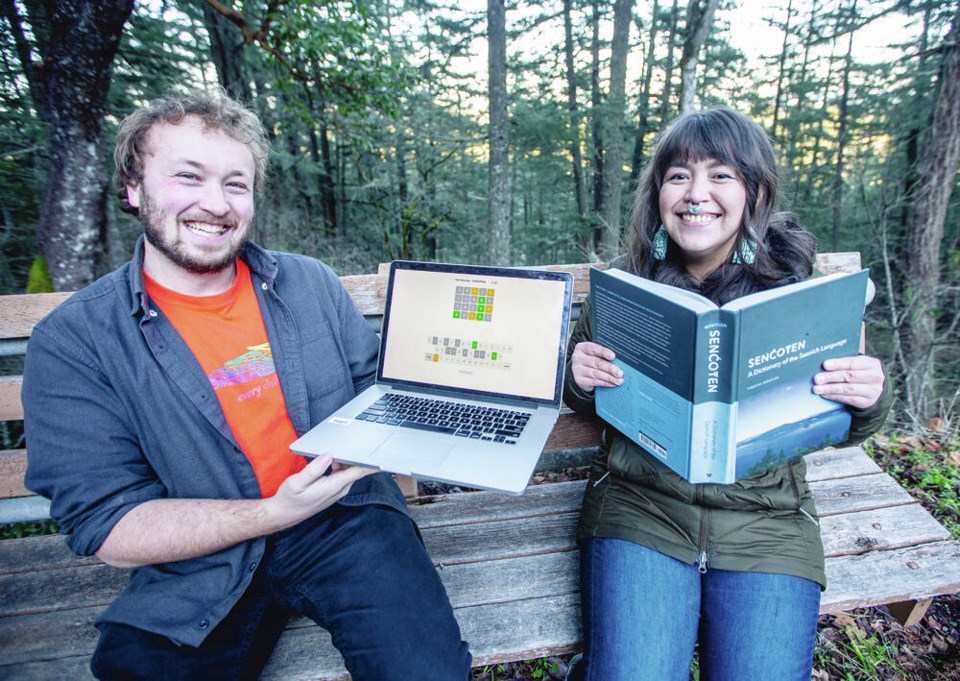Like millions of people around the world, Catherine Blackstock is hooked on a game where you try to guess the daily five-letter word.
When she finally got a green square in the Wordle-like game — which gives you six tries to guess the day’s pre-determined word and lets you know when you’ve placed a letter in the correct place by turning that space green — “it was so exciting,” she said.
Blackstock, a hereditary chief of the Gitxsan Nation in northwestern B.C., isn’t playing in English. She’s using a version of the game that’s been created for her own language.
Blackstock had never tried the original English version when she started playing in the Gitksan Indigenous language, but she quickly became excited about the game, which she has played every day for about a week. It helps Blackstock meet her goal of committing 15 minutes a day to Gitksan.
“It’s another way to reawaken the language,” she said.
Blackstock often refers to the Gitksan dictionary while playing, using it once she knows a couple of the letters in the day’s puzzle to search for words that include those characters. Poring over the dictionary each day means she’s learning new words often as she works out the the daily Wordle.
Blackstock successfully completed her first puzzle a few days ago, guessing duxwsxw, which means to be short of something or to not have much of something, in four tries. The “xw” together act as one character and are pronounced similar to a whisper.
“I didn’t even go to bed till I finished it,” she said. “While I’m doing all this practising and stuff, it does get me back into looking at the words and what they mean and, you know, just that refresher.”
The Gitksan Wordle was created by Victoria software developer and linguist Aidan Pine, who has worked on several language revitalization projects, including as a developer on a University of British Columbia project to create a dictionary app for the Gitksan language.
The original Wordle was created by a Brooklyn software engineer, Josh Wardle, and was designed for his partner, a word-game lover. He released the game to the world in October, and it quickly became a global phenomenon as social media feeds filled with coloured grids showing players’ results.
“My roommate was playing Wordle, her parents were playing Wordle, my parents were playing Wordle, everybody was playing Wordle,” Pine said. He thought it would be straightforward to adapt for other languages.
Pine played with open-source code created by another developer to create a version that was adaptable to any language. He plugged in a word list from Gitksan and adjusted the alphabet to allow Gitksan characters.
“What I’m hearing is it’s getting people excited to look words up in the dictionary. It’s getting people thinking about the language every day,” he said.
After posting online about the Gitksan version, Pine was contacted by PEPA岣碔YE (pronounced Puh-pah-key-uh) who was interested in a version for speakers of SEN膯O纽EN, the language of the W瘫SÁNE膯 people on the Saanich Peninsula.
Like Blackstock, PEPA岣碔YE quickly became obsessed with the game. It’s become the first thing she does in the day, enjoying it with her morning coffee and an open dictionary.
“It’s really rare to find something that’s this accessible in the language, so it feels really nice to be included in this type of fad and to be able to enjoy it in the language,” she said.
The code Pine wrote to create a Wordle that’s adaptable to any language is available for use by others, and already someone has started working on a Hawaiian version. He’s also written a blog post to walk people through the steps of how to create their own version, which could be used by other developers or “a very enthusiastic kind of tech-savvy person,” he said. “I’m a big fan of more people getting involved in this.”
While he recognizes that games like Wordle can support language learners, Pine said he’s it’s important to remember that technology is not what keeps languages alive.
“People revitalize languages through hard work and determination. And if small games like this can help or make it easier, that’s great.”
Links
Not Wordle Gitksan:
Not Wordle SEN膯O纽EN:
Pine’s code to adapt Wordle to any language:



